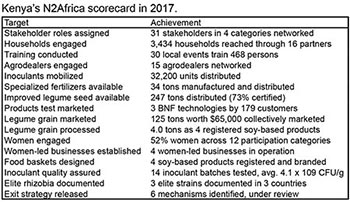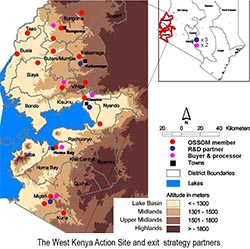| The final year of N2Africa in Kenya was committed to positioning for lasting project impact. These actions are illustrated through our accompanying 2017 project “scorecard”. As Tier 1 operations are partner-led, household engagement and farmer training was largely conducted by others and loosely monitored using project M&E tools. A paradigm shift from community-based outreach to “last mile” agrodealer support was undertaken. This allowed for BNF product testing by customers and outreach via open houses. One of the great advantages to BNF technology promotion in Kenya is that inoculants, blended fertilizers and seeds of improved legume varieties are available as products from the private sector. N2Africa worked with stakeholders to ensure that these technologies were available to farmers through our agrodealer network and outreach partners. |  |
One emerging consequence of partner-led approaches is that reporting becomes voluntary and some activities (such as farmer participation and grain marketing and processing) are likely under-reported. Special care was taken, however, to directly organize the registration and branding of soya-based food products, and to monitor the participation of women across several project categories. Close collaboration continued with the University of Nairobi MIRCEN in all areas of rhizobiology. Efforts during 2017 led to the development of a project exit strategy that is currently under review.
| Kenya’s N2Africa exit strategy is based on several intersecting goals. Input manufacturers and seed companies will continue to invest in legume production inputs, and expand their scope of operations, including greater incentives to “last mile” agrodealers. MIRCEN will continue to provide independent testing of biofertilizers and legume inoculants. Local agrodealers will continue to stock BNF technology products and find their trade as profitable as other product lines. The processing and diversity of legume-based products will continue and investment into localized grain legume marketing and processing will increase, and consumer acceptance of these legume products will grow. Three kinds of stakeholder partnerships established by N2Africa in Kenya shall continue: a) profitable input supply, b) profitable processing and trade in soyabeans, and c) continued networking among stakeholders and extension service providers. |  |
Profitable input supply
MEA LTD will continue to manufacture BIOFIX legume inoculant and Sympal legume fertilizer, and to package these inputs into sizes appropriate for investment by small-scale farmers. Agriseed (SeedCo) Ltd will continue to produce and market soyabean seed that is suitable for different food and industrial purposes, and actively market them to small-scale farmers. Agriseed also distributes Bayer’s RhizoLiq Top liquid inoculants. The Western Kenya soyabean Seed Growers for Community Seed Bulking will continue to assist in community-based seed production. County-level agricultural extension in key soyabean production areas will link with these input suppliers and distribution channels.
Profitable trade and processing
Marketing opportunities for grain legumes, particularly soyabean, will continue to expand, with much of the crop consumed in a way that improves human nutrition. Reliable buyers and processors of soyabean grain in west Kenya include Victoria Feeds (Kisumu), AWE (Luanda), GreenSpecs (Eldoret), Gesiche Feed (Nakuru), Kirinyaga Millers (Nairobi), Soy Afrique (Thika), and Equatorial Nuts (Nairobi). Women-led soyabean processing agribusinesses initiated through N2Africa, United Grain Masters and Christynet soyabean Enterprises will succeed and grow.
Technology dissemination partnership
During the final year of N2Africa in Kenya, our dissemination strategy focused upon the establishment of the One Stop Shop Operation Mechanism (OSSOM). This mechanism combined 15 “last mile” One Stop Shops that stock and sell legume production inputs as well as provide extension services for legume crop production. These shops were strategically linked to farmer associations and county extension services. Many of these shops not only market inputs, but also coordinate local commodity collection points and operate value-added processing facilities.
Recently, linkages to two R&D programs were forged. These include Kenya Industrial Research and Development Institute that established three accredited soyabean processing factories open to tenancy agreement, and the Kenya Agriculture and Livestock Research Organization (formerly known as KARI) that operates an accredited seed grower network, as well as conducts research on legume production. The latter program permits community-based organizations to produce accredited legume seed, a much-needed development.
The Deputy President’s Office has established a soyabean Task Force to oversee commercial production of soyabean through County Governments. It was successfully piloted in Migori County through the Food to Markey Alliance with support of the World Food Programme and N2Africa. OSSOM serves as a member of that task force. The Ministry of Industrialization is providing services on soyabean product development and offering common manufacturing facilities for commercial processing and packing of certified soya products by small businesses for a nominal fee. OSSOM members take advantage of this opportunity to produce a range of licensed, soya-based food products. One huge advantage in Kenya is that both BNF input manufacture and grain legume processing are fully commercialized, in part through eight years of N2Africa assistance, and our exit strategy largely depends upon their continuation.
The N2Africa Project Kenya Exit Strategy report is available here.
Paul L. Woomer, Welissa Mulei, Nancy K. Karanja and Josephine Ongoma, November 2017
